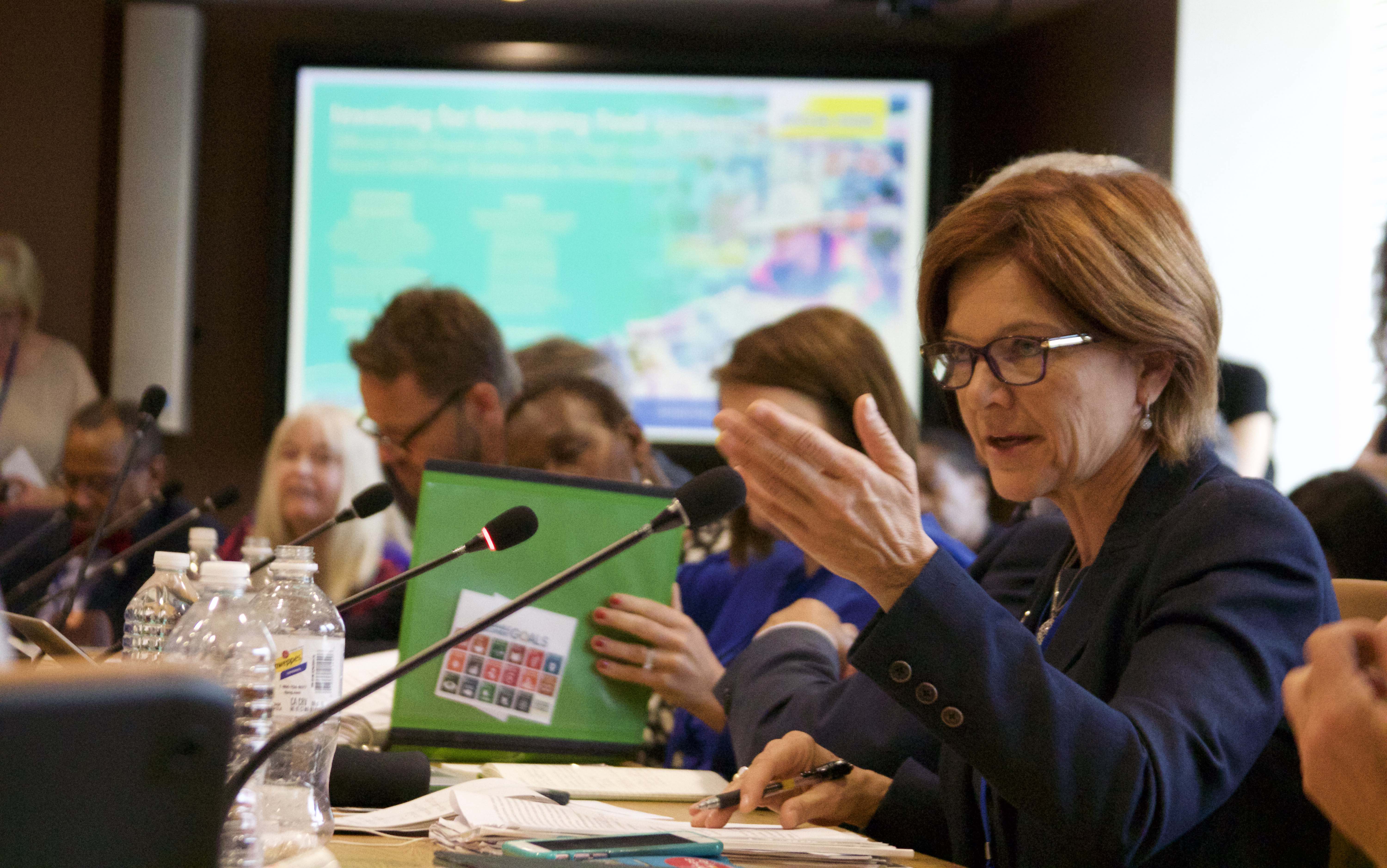Strong political leadership is urgently needed to fix food systems that face unprecedented stresses from climate change, conflict, and other problems, panelists agreed at a July 11 side event at the 2018 U.N. High-Level Political Forum (HLPF) on Sustainable Development.
Investing for Reshaping Food Systems was hosted by IFPRI and the Permanent Representatives of Canada and Jamaica to the United Nations. The event explored ways to invest in food systems to achieve the Sustainable Development Goals (SDGs).
The problems are global, hitting both low-income and high-income countries. In Canada, food systems are currently unsustainable, with millions being left behind including indigenous populations that experience high levels of anemia, while simultaneously large amounts of food and water are wasted, said Louise Blais, Canada’s U.N. ambassador.
In a world where hunger is rising, undernutrition persists, and we are confronting growing crises of overweight, obesity, and related noncommunicable diseases, IFPRI Director General Shenggen Fan urged that significant investments—like those made in the big staple crops—be made in healthy foods such as fruit and vegetables. Current agricultural subsidies also contribute to climate change. “Subsidies are not sustainable,” Fan said, calling for taxes on unsustainable food products in wealthy countries and particularly those where meat consumption is high.
In line with the 2018 HLPF theme, “Transformation Towards Sustainable and Resilient Societies”, Courtenay Rattray, Jamaica’s U.N. ambassador, affirmed his country’s commitment to encouraging the production of local food and noted that its agricultural industry’s contribution to GDP increased from 6.6 percent in 2016 to 7.3 percent in 2017. “Hunger and poverty must be addressed by raising productivity and incomes,” he added, concluding that it is critical to align national agriculture, nutrition, and other initiatives to make policies coherent.
Collaboration between national and local governments is critical to making the investments required for reshaping food systems, several panelists said, urging the international community not to lose sight of this.
“When we see a reversal of progress … more people are going hungry than before … we need a clarion call to urgency,” said Nichola Dyer, program manager of the Global Agriculture and Food Security Program (GAFSP) at the World Bank, referring to Sustainable Development Goal 2, ending hunger and malnutrition by 2030. Empowering local leadership is critical, she said, along with investing in inclusive food systems that are outcome-driven and can address multiple challenges including reducing farmers’ risk, empowering women and girls, and increasing the capacity of smallholders.
“If we are convinced that nutrition and food security are cross-cutting issues—markers of development—make sure that there is political ownership or buy-in for the issue!” said Gerda Verburg, coordinator of the Scaling Up Nutrition (SUN) Movement. Despite the 2008 food crisis, overall investments in agriculture and food production decreased between 2001 and 2016, Verburg noted. To make progress, she said, individual countries must own these issues and mobilize commitment from all stakeholders—governments, civil society, private sector, and researchers.
Echoing the need for country-driven solutions, Chantal Line Carpentier, chief of the U.N. Conference on Trade and Development (UNCTAD) New York Office, recommended a focus on gender equity. National development banks should provide more investment in female entrepreneurship in rural areas, and officials should consider the impact of trade agreements on women. Agriculture ministers should also change their perspective to view investments as supporting small micro-enterprises rather than “funding farmers,” she said, and pro-poor, bottom-up technologies responsive to local needs are critical.
As agriculture continues to stress planetary systems, inefficient water use is a key problem, said Claudia Sadoff, Director General at the International Water Management Institute (IWMI). That means we must accelerate the productivity of water used in agriculture and adapt agricultural systems to a more water-scarce world. Food systems must also become more resilient to disruptions, she said, via tools such as better forecasting and warning systems along with stronger social safety nets that include flood and drought insurance.
The development community has been discussing such approaches for a long time while problems have grown, panelists agreed. “We need to transition from policy dialogue to concrete actions,” Blais concluded.
Katarlah Taylor is an IFPRI Senior Events Specialist.







